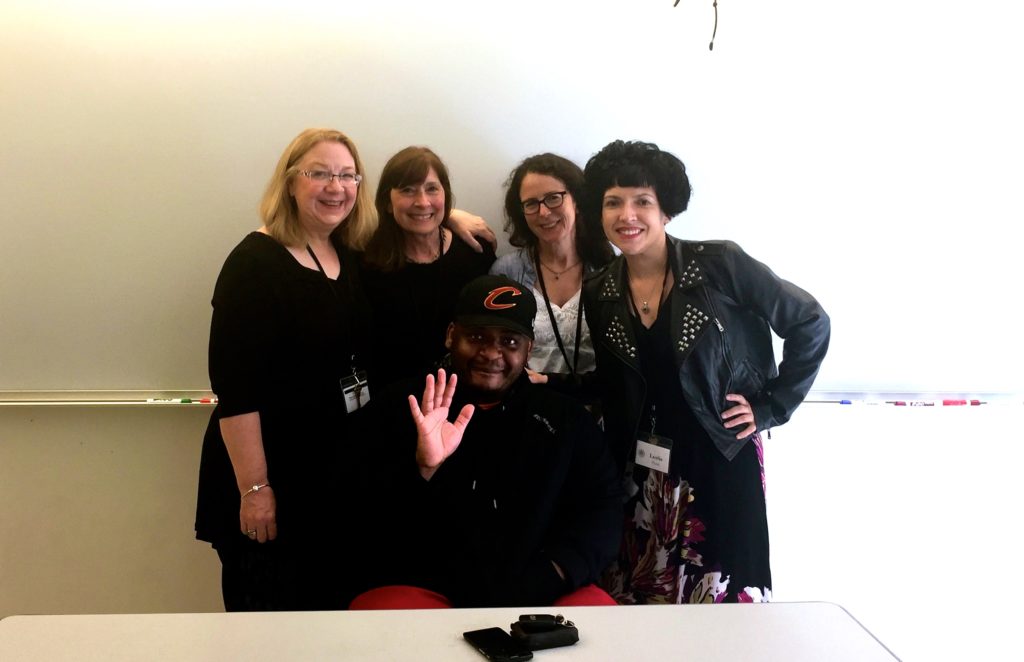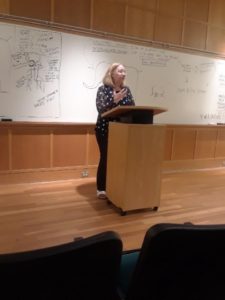Want to Know How I Write? Read about David Ryan's Craft Talk at Colgate University

My group of readers at Colgate, led by professor and author Kiese Laymon
When you spend a week with many gifted writers and erudite minds at a writer’s conference, it’s near impossible to focus on just one memory, but David Ryan’s craft talk on memory and consciousness will stay with me for a very long time. David is a musician who toured with a rock band, an avid reader, an author and professor, a cancer survivor, and a father. I love the way his mind twists and turns, probably because it echoes my own mind and the way I come up with stories to write about. Just when I think I’ve arrived at a conclusion, my mind veers off and takes another severe turn.
Which is kind of like life.
Which was the point of his craft talk on story, consciousness, and memory.
It all began with a picture of an elephant on the board, which immediately caught my attention. I wondered how he’d use it as a prop for his talk. When I worked in cause-related marketing, I used a picture of an elephant to explain that if we only touched an elephant’s ear we’d think it was one animal, its trunk still another, and its rear another thing still. Based on our individual sensory experience, we’d define what that elephant was, and our label could be an entirely different animal than the one standing in real, obvious, whole form before us. Our experience of everything in the world is all about sensory experience and our perspective, which is neither wrong or right, it’s just ours. That’s also why I was drawn to InVision(R) coaching, because it uses creative visualization, metaphor, and sensory experience to give us insight about ourselves.
Here’s David’s premise about how art imitates life, and how life sends us back to creating art out of it:
- Consciousness is a series of freeze frames.
- Voluntary memory focuses on one of these frames: “I saw an elephant once.”
- Yet Involuntary Memory is everything else that is triggered as memory as you remember the elephant: “I remember my parents had an argument right before we left the house to go to the circus.”
- The memory of the elephant thereby triggers emotions.
- We humans have a selective focus, which determines which frames we’ll focus on and remember, one frame in an otherwise infinite depth of field.
- Our Perspective causes us to step from frame to frame, or star to star, in a vast Universe of experience.
- Yet those other freeze frames are still there, floating around in our subconscious.
- Often an involuntary memory is triggered by sensory detail.
- That’s what the best writing does: It uses sensory detail to trigger those memories that are just beneath the surface, or out of view because our depth of field is focused on one frame and not those just beyond it.
- It creates someone (a Protagonist) for us to follow through a plot, “the Soul of the Story” to examine those subconscious memories, our thoughts and beliefs about them, to arrive at some new inspiration or insight.
- “We are fabricating memories and planting them in the reader.” David says. And sometimes, when we experience Life, what’s happening will suddenly trigger a memory of a book we read long ago, which then makes another frame, thus changing our perspective, and our reality.
That’s why writing is an act of consciousness. “In revision we distill the memory, refine the dream, to create Poignancy,” according to David. For me, Poignancy, the kind that sends shivers down my back, in my reading or my writing, is simply words tapping into my subconscious memory and perspective, and nudging me, “See? Remember that day? That moment? Now that you’re older, wiser, you can see it differently, make it more meaningful, or change its meaning entirely.”
That’s how I write. I start with a memory, say of a couple meeting for the first time on a disco dance floor, coupled with a conversation I overheard in an Ethiopian restaurant where an American woman was introducing her African boyfriend to her parents. Then I start adding sensory details from my imagination or subconscious. They are the spices that move the story forward. If I get it exactly right, my story in The Shores of Our Souls will send shivers of recognition and resonance down your spine. And just like me, you’ll suddenly understand something in a way you’ve never done before.

My reading from The Shores of Our Souls at Colgate in front of the elephant in the room
David was able to convey the magic of creating and revising a story in a single hour with his elephant metaphor: the magic that happens when you begin to record a memory, which leads to a feeling, which leads to the next memory. I’ll be following his work for a long time to come!
If you’d like to see his mind at work, read his story collection Animals in Motion or his essays.
You can reach me at info@shoresofoursouls.com. You can pre-order The Shores of Our Souls today.
How do you write? What comes to mind first? An image? A sound? A memory?
What sends shivers down your back when you find a book you can’t put down?
No Comment
You can post first response comment.